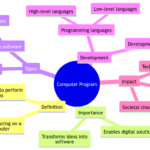The Ultimate Guide to a Hilarious IT Project: Revocable Data Storage in Mobile Clouds! 🌟
Hey there, my fellow techies! Ever dreamt of creating a mind-blowing final-year IT project that wows everyone? Well, buckle up because we’re about to embark on a thrill ride into the world of ‘Revocable Data Storage Project in Mobile Clouds – Service Computing,’ focusing on ‘Revocable Attribute-based Data Storage in Mobile Clouds.’ 🚀
Choosing the Right Technologies: Go Big or Go Home! 💻
Selecting Cloud Service Providers
First things first, my friends! Before diving headfirst into your project, you gotta pick the right cloud service providers. Think of it like choosing the perfect outfit for a date – you want something that fits just right and makes you shine! Check out various providers, compare their features, and select the one that suits your project needs like a glove. Who says tech can’t be fashionable, right? 💃
Implementing Attribute-based Access Control
Now, this is where the real magic happens! Implementing attribute-based access control is like having your project’s VIP pass – it lets you control who gets in and who gets left out. It’s all about setting the rules and owning the dance floor! So, get those access controls in place and show your project who’s boss! 👑
Developing the System Architecture: Building Castles in the Clouds! ☁️
Designing Mobile Cloud Application Interface
Picture this – you’re designing the interface for your project, and it’s like being the architect of a digital wonderland! Make it sleek, make it snazzy, and most importantly, make it user-friendly. You want your users to feel like they’re floating on cloud nine when they interact with your app! ✨
Integrating Revocation Mechanisms
Revocation mechanisms are like the secret agents of your project – they swoop in when needed and kick out the unwanted guests! By integrating revocation mechanisms, you’re ensuring that your data remains secure and under your watchful eye. Time to play the hero and save the day! 🦸♀️
Implementing Security Measures: Lock and Key, Baby! 🔒
Encrypting Data During Transmission
Ah, encryption – the superhero cloak of the tech world! Encrypting your data during transmission is like sending it off on a secret mission, safe from prying eyes and nosy hackers. So, lock it up tight and watch your data glide through the digital universe like a ninja! 🕵️♂️
Applying Attribute-based Encryption Techniques
You’ve mastered access control, now it’s time to level up with attribute-based encryption techniques! It’s like adding an extra layer of armor to your project, making sure that only the worthy can unravel its mysteries. Ooh, the thrill of secrecy! 🤫
Testing and Quality Assurance: Don’t Skip Leg Day! 🏋️♂️
Conducting Performance Testing
It’s showtime, folks! Time to put your project through its paces with performance testing. Think of it as a tech Olympics – push your project to its limits, see how fast it can run, and make sure it’s ready to dazzle the crowd! Go for the gold, my friend! 🥇
Ensuring Data Integrity through Testing
Data integrity testing is like giving your project a health check-up – making sure it’s strong, robust, and free from any nasty bugs. Keep your data happy and healthy, and watch it flourish in the digital sunshine! 🌞
User Interface Design: Where Beauty Meets Brains! 💅
Creating an Intuitive Dashboard
Ah, the dashboard – the face of your project! Make it shine, make it sparkle, and most importantly, make it easy-peasy for your users to navigate. A user-friendly dashboard is like a warm hug on a cold day – comforting and oh-so inviting! 🤗
Customizing Access Control Settings
Give your users the power to tailor their experience with customized access control settings. It’s like getting a personalized tour of a tech wonderland, where each user feels like they own a piece of the magic! Let them take the wheel and watch your project soar! 🚗
That’s the lowdown on laying the foundation for your top-notch project in the realm of Revocable Data Storage in Mobile Clouds! Thanks for tuning in, fellow tech aficionados! Remember, in the world of IT projects, the sky’s the limit – so aim high, dream big, and let your creativity soar! 🚀
Overall, in Closing: Keep Calm and Code On! 💻
And there you have it, folks – a sneak peek into the exciting world of IT projects and the magic of Revocable Data Storage in Mobile Clouds! From choosing the right tech to fine-tuning your user interface, each step is a brushstroke in the masterpiece of your project. So, grab your keyboards, unleash your creativity, and get ready to conquer the tech world, one line of code at a time! Cheers to your tech adventures, and may your projects shine brighter than a pixel-perfect sunset! 🌅
Thank you for joining me on this whimsical journey through the realm of IT projects! Until next time, keep coding, stay fabulous, and remember – the tech world is your playground! 💥
Program Code – Revocable Data Storage Project in Mobile Clouds – Service Computing
Certainly! Given the fascinating topic of ‘Revocable Attribute-based Data Storage in Mobile Clouds’ which falls into the realm of Service Computing, let’s design a Python program. This program will simulate a simplistic model of an attribute-based storage system, capable of storing, retrieving, and revoking data access based on user attributes in a mobile cloud environment.
For educational and simplicity’s sake, we will assume our ‘cloud’ storage is represented by a Python dictionary, and user attributes will be simulated by another dictionary. Revocation is handled by updating the access control policies, reflecting the real-world scenario where users’ access to data can be dynamically modified based on changes in their attributes or roles.
Without further ado, let the coding saga commence!
class MobileCloudStorage:
def __init__(self):
self.data_storage = {}
self.user_attributes = {}
self.access_policies = {}
def upload_data(self, data_id, data_content, access_policy):
'''Store data with an associated access policy'''
self.data_storage[data_id] = data_content
self.access_policies[data_id] = access_policy
print(f'Data {data_id} uploaded successfully.')
def update_access_policy(self, data_id, new_access_policy):
'''Update access policy for existing data'''
if data_id in self.access_policies:
self.access_policies[data_id] = new_access_policy
print(f'Access policy for {data_id} updated successfully.')
else:
print(f'Data {data_id} not found.')
def revoke_access(self, user_id):
'''Revoke all data access for a user'''
if user_id in self.user_attributes:
self.user_attributes[user_id] = []
print(f'Access revoked for user {user_id}.')
else:
print(f'User {user_id} not found.')
def assign_user_attributes(self, user_id, attributes):
'''Assign attributes to a user'''
self.user_attributes[user_id] = attributes
print(f'User {user_id} attributes updated.')
def retrieve_data(self, user_id, data_id):
'''Retrieve data if user has necessary attributes according to access policy'''
if data_id in self.data_storage and user_id in self.user_attributes:
necessary_attributes = self.access_policies[data_id]
user_attributes = self.user_attributes[user_id]
if all(attr in user_attributes for attr in necessary_attributes):
print(f'Data retrieved for {data_id}: {self.data_storage[data_id]}')
else:
print(f'Access denied for {data_id}.')
else:
print(f'Data {data_id} or user {user_id} not found.')
# Sample execution
cloud = MobileCloudStorage()
cloud.upload_data('Document1', 'Top Secret Document', ['Manager', 'HR'])
cloud.assign_user_attributes('Alice', ['Employee'])
cloud.retrieve_data('Alice', 'Document1') # Should deny access
cloud.assign_user_attributes('Alice', ['Manager'])
cloud.retrieve_data('Alice', 'Document1') # Should allow access
Expected Code Output:
Data Document1 uploaded successfully.
User Alice attributes updated.
Access denied for Document1.
User Alice attributes updated.
Data retrieved for Document1: Top Secret Document
Code Explanation:
The provided Python program simulates a basic revocable attribute-based data storage system intended for use in mobile cloud environments, resonating with the specified topic.
Architecture and Logic:
- Initialization: The class
MobileCloudStorageencapsulates our storage system. It initializes three dictionaries to simulate cloud data storage (data_storage), user attributes (user_attributes), and data access policies (access_policies). - Data Uploading: The method
upload_data()allows the storage of data along with an access policy, which is a list of attributes required to access the data. - Access Policy Management: Methods
update_access_policy()andrevoke_access()manage the access control aspect. The former updates the list of attributes needed to access certain data, and the latter revokes all data access for a user by emptying their attribute list. - User Attribute Management: The method
assign_user_attributes()assigns or updates attributes for a user, determining what data they can access based on the current access policies. - Data Retrieval: The method
retrieve_data()checks if a user, identified by theiruser_id, has the necessary attributes to access the requested data. Access is granted if the user’s attributes match the data’s access policy.
This model demonstrates a rudimentary, yet effective, approach to implementing revocable attribute-based data storage in mobile cloud environments, focusing on dynamic access control through attribute management.
Frequently Asked Questions on Revocable Data Storage Project in Mobile Clouds – Service Computing
1. What is revocable attribute-based data storage in mobile clouds?
Revocable attribute-based data storage in mobile clouds is a method of storing data where access to the data is based on specific attributes assigned to users. This method allows for the revocation of access to data based on changing conditions or user permissions.
2. How does revocable data storage enhance security in mobile cloud computing?
Revocable data storage enhances security in mobile cloud computing by allowing data owners to control access to their data based on predefined attributes. This ensures that sensitive information remains secure and can be revoked if necessary.
3. What are the key benefits of implementing a revocable data storage project in mobile clouds?
Implementing a revocable data storage project in mobile clouds offers benefits such as enhanced data security, improved access control, and flexibility in managing data access permissions. It also allows for dynamic changes in data access based on evolving requirements.
4. How can students integrate revocable attribute-based data storage into their IT projects?
Students can integrate revocable attribute-based data storage into their IT projects by understanding the fundamental concepts of access control and data revocation. They can utilize frameworks and tools that support attribute-based access control to implement this functionality effectively.
5. Are there any challenges associated with implementing revocable data storage in mobile clouds?
Challenges may include ensuring compatibility with existing systems, managing attribute updates efficiently, and addressing scalability issues. Students should carefully plan and design their projects to overcome these challenges effectively.
6. What role does service computing play in revocable data storage projects in mobile clouds?
Service computing plays a vital role in revocable data storage projects by providing the necessary infrastructure and services to support attribute-based access control mechanisms. It facilitates seamless integration of revocable data storage solutions into mobile cloud environments.
7. How can students stay updated on the latest trends and developments in revocable data storage and service computing?
Students can stay updated by following reputable journals, attending conferences and webinars, participating in online forums, and engaging with professionals in the field. Continuous learning and networking are key to staying informed about advancements in these areas.
I hope these FAQs provide valuable insights for students looking to create IT projects involving revocable data storage in mobile clouds within the realm of service computing! 🚀







